Occupied Ukraine encouraged to vote in Russian election by armed men
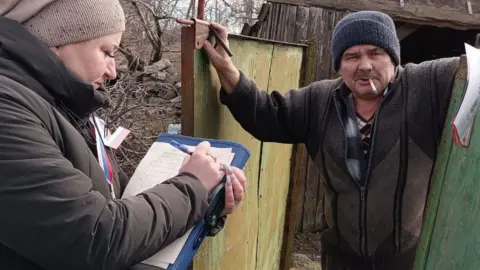 Russian-controlled Donetsk election commission
Russian-controlled Donetsk election commissionMoscow has launched a wide-ranging campaign telling residents of occupied parts of Ukraine to vote in Russia's presidential election.
For the first time, the national vote is taking place over three days (15-17 March), but additional early voting has already begun in the occupied parts of four Ukrainian regions: Zaporizhzhia, Kherson, Donetsk and Luhansk.
One resident complained of pro-Russian collaborators with ballot boxes going from house to house looking for voters accompanied by armed soldiers.
Vladimir Putin will certainly win another term of office, but a high turnout would help the Kremlin's efforts to legitimise his continued rule.
It would also be used to justify Russia's invasion of Ukraine.
Vladimir Putin is one of four candidates on the ballot, but none of the others poses a realistic challenge.
All of his most outspoken critics have either been forced into exile, jailed, or have died.
Coerced into voting
Voting normally starts early in remote parts of Russia, but the procedure has been extended to the four partially occupied regions of Ukraine "for security reasons".
There are a variety of ways in which Ukrainians under occupation are being coerced into voting.
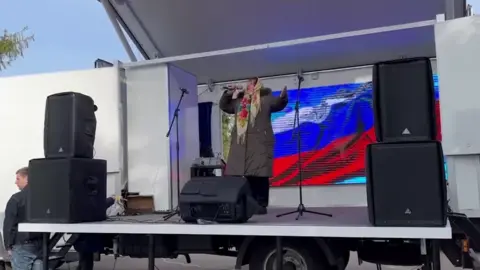 Tavria TV
Tavria TVEven though occupation authorities have set up polling stations, voters are not required to visit them as those same authorities have dispatched people with ballot boxes to their homes.
"Dear voters, we worry about your safety! You do not have to go anywhere to vote - we will come to your home with ballots and boxes!" the Russia-installed electoral commission in the Zaporizhzhia region said on social media.
Ukrainians under occupation are also put under pressure through a pro-vote campaign called InformUIK, ostensibly designed to inform them about the procedure of voting, as well as all the candidates.
It seeks to visit all remaining residents of Russian-occupied regions at home - and its representatives are often accompanied by armed men.
They collect personal data to compile lists of voters, and sometimes film local residents during such visits. Russia's electoral chief in the partly occupied Zaporizhzhia region acknowledged that locals were worried about the filming.
Ukrainians have already come under considerable pressure to take Russian passports, but Ukrainian passports are being accepted as proof of ID to make voting even easier.
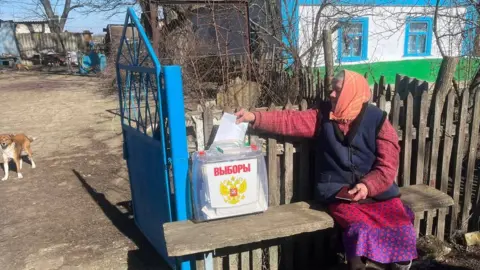 Russian-controlled Kherson election commission
Russian-controlled Kherson election commissionResidents have been sent text messages informing them of the dates of the vote and tried-and-tested Soviet methods are also being deployed to attract them to polling stations, such as free concerts and food.
'It is abnormal when citizens collaborate'
Ukraine has dismissed the vote as an illegitimate sham, and those involved in organising it have been targeted by attacks.
The day early voting started in occupied parts of the Kherson region, on 27 February, there were two explosions in Nova Kakhovka: one targeting the offices of the Kremlin's United Russia party, and the other near a polling station.
Then last week Ukraine's Main Intelligence Directorate said a local woman helping the Russian administration hold the election had been "liquidated" in a car bombing on 6 March in the occupied town of Berdyansk in the Zaporizhzhia region.
Asked about who carried out the attack, the Ukrainian governor of the Zaporizhzhia region, Ivan Fedorov, told the BBC: "Somebody did it. Somebody who showed great resistance. Some heroes who do it on temporarily occupied territories.
"Our resistance shows that it is abnormal when our citizens collaborate with Russians. Somebody did not understand. That's why this somebody got killed."
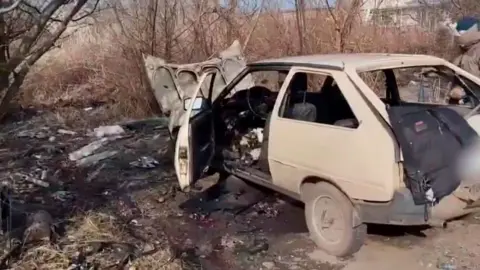 Ukrainian intelligence
Ukrainian intelligenceWhen asked to clarify if people behind the attack were linked to the Ukrainian state, Mr Fedorov added: "Yes, of course. There is great co-operation between our resistance inside the temporarily occupied territories and our secret services."
While Russia-installed officials and media in occupied parts of Ukraine are busy promoting the vote, they do not focus too much on drumming up support for any particular candidate - and they don't need to.
Vladimir Putin is the mastermind of these regions' annexation by Russia, and nationally the vote is being presented as an endorsement.
The official symbol of the 2024 presidential election is the V-sign associated with his "special military operation" in Ukraine. The official slogan adopted by Russia's Central Electoral Commission is "Strong together - vote for Russia!"
Both the V symbol and the slogan appear in posters dotted around occupied parts of Ukraine, including at polling stations.
Kremlin media have already trumpeted early voting in Ukraine as a resounding success.
'This isn't democracy, it's a comedy show'
"It was a real holiday! With music, balloons and Russian flags!" the Komsomolskaya Pravda tabloid said of the early voting campaign in the Kherson region, which concluded on 3 March. "Tens of thousands of people!"
Kremlin propaganda is using the election to paint a picture of unanimous support for Russia's invasion and annexation of Ukraine.
But these carefully choreographed images come at the expense of thousands of critics silenced, deported, jailed or killed. Many have left - especially young people - unwilling or unable to live under Russian occupation because of their views.
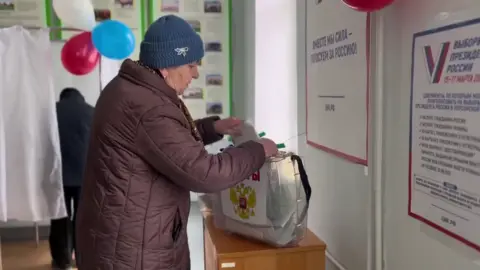 Russian-controlled Kherson election commission
Russian-controlled Kherson election commissionUkraine's Zaporizhzhia governor, Ivan Fedorov, says local residents of his partly occupied region are being intimidated into voting: "They go to every flat and every house and ask - would you like to vote?
"Our citizens are very afraid. Of course if Russians with soldiers come to their flat and ask if they'd like to vote for Putin, everyone will say: OK, yes. Because everyone wants to save their life. But it does not mean that our citizens want to support Putin."
One resident of the Kherson region - the south-eastern part which is occupied by Russian forces - described to the BBC how voting was organised in his village.
We are unable to disclose his name or location due to security concerns.
"Pro-Russian locals visit households with ballot boxes, accompanied by armed military men. If they knock and no one opens, they move on to the next house. They don't break into houses, but they do visit," the local resident said.
They added: "This is ridiculous. What kind of election is it when there are two locals - one holding a list of voters and the other a ballot box - and a military man with a machine gun? This isn't democracy. It's a comedy show."
